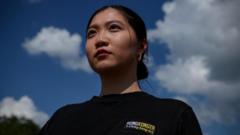Hong Kong police have arrested the father and brother of US-based pro-democracy activist Anna Kwok on allegations of aiding her financially, according to various media reports. This marks the first instance where the relatives of an individual designated as an "absconder" have faced charges under the territory's controversial security law, as reported by Reuters.
The 26-year-old Kwok is accused of violating Hong Kong's national security legislation due to her involvement in pro-democracy protests in 2019. After fleeing the territory in 2020, she became the Executive Director of the Hong Kong Democracy Council (HKDC), an organization based in Washington, D.C.
Authorities apprehended two men aged 35 and 68 on suspicions of managing "funds or other financial assets" linked to Kwok. Local media later identified them as her father and brother, referencing police sources. Investigative efforts stemmed from observations of the pair meeting Kwok overseas.
The older man, identified as Kwok Yin-sang, has been accused of assisting his daughter in managing her insurance policy upon returning to Hong Kong. As outlined in a charge sheet obtained by Reuters, Kwok Yin-sang allegedly sought to access his daughter’s life and accident insurance policy, potentially to secure funds on her behalf. He has been denied bail by national security judge Victor So during hearings at the West Kowloon Magistrates' Courts, according to Reuters.
Conversely, the 35-year-old brother, identified by media as Ms. Kwok's sibling, is charged with supporting their father's attempts to access the funds. He has since been released on bail while the investigation continues.
In a previous statement, Kwok highlighted the Hong Kong government's issuance of bounties on several pro-democracy activists, including herself, emphasizing that such actions were aimed at instilling fear among them. She characterized this atmosphere of intimidation as a tactic employed by the Hong Kong authorities and the Chinese Communist Party to silence dissenters.
Since 1997, when Hong Kong transitioned from British rule to a Special Administrative Region of China, the area has been perceived as losing the freedoms once enjoyed, with many believing that the gap continues to narrow in light of increasing governmental control.






















